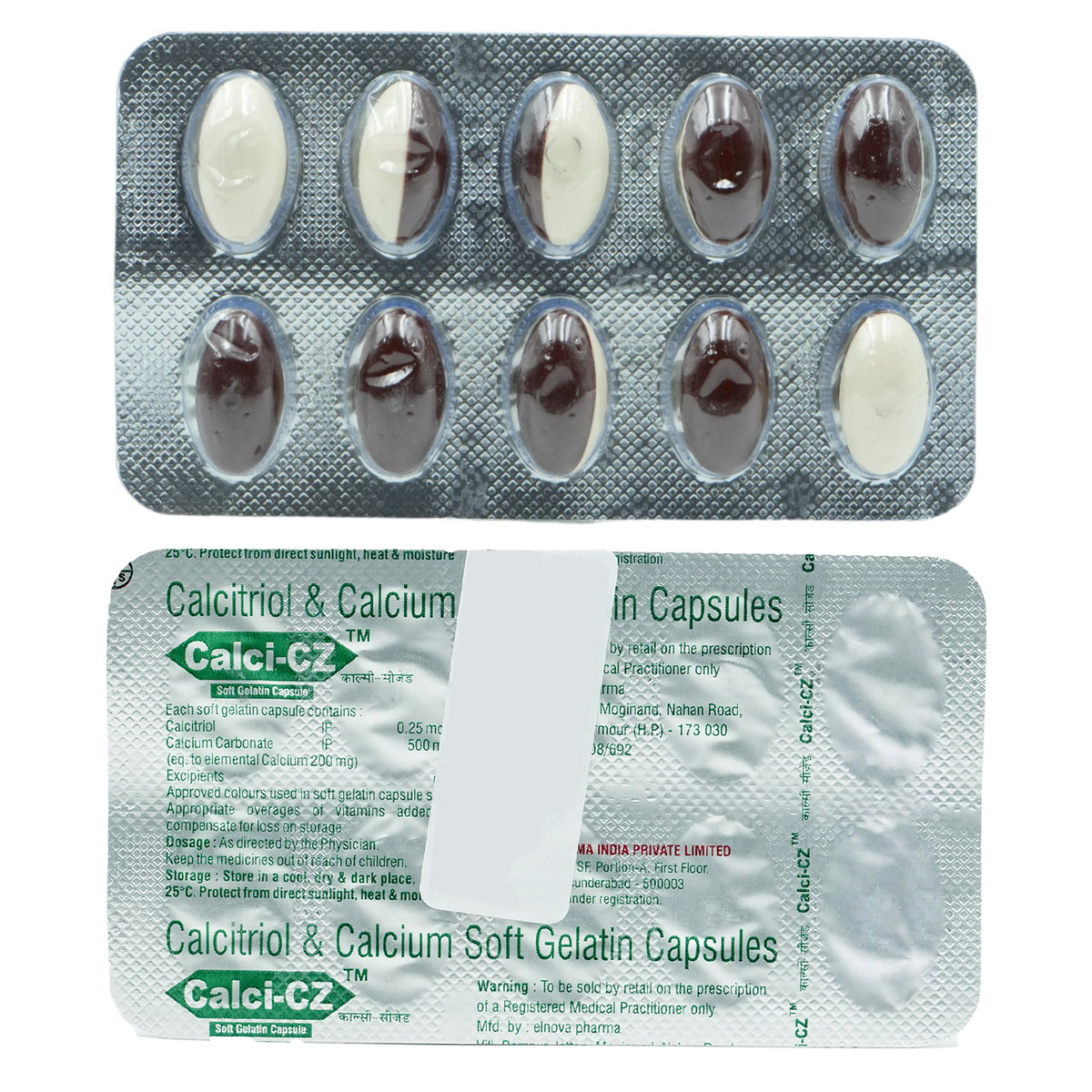Calcium+calcitriol
About Calcium+calcitriol
Calcium+calcitriol belongs to the class of 'vitamins,' primarily used to treat various conditions caused by low calcium levels in the body like Vitamin D deficiency, osteoporosis (weak and brittle bones), hypoparathyroidism (a condition in which parathyroid glands make low levels of calcium in the body), latent tetany (a muscle disease with low blood calcium levels), and rickets or osteomalacia (softening or deforming of bones due to lack of calcium).
Calcium+calcitriol consists of calcium and calcitriol (vitamin D). Calcium is a mineral that is used to prevent or treat a calcium deficiency. It provides essential nutrients to maintain bone formation. Calcitriol is a synthetic form of vitamin D that helps maintain blood calcium and phosphorus levels and mineralization of bone.
Calcium+calcitriol is likely safe to take. In some cases, it may cause side effects like constipation and stomach upset. These side effects do not require medical attention and gradually resolve over time. However, if the side effects persist or worsen, please consult a doctor.
Let your doctor know if you are using any other medicine, or herbal products before starting Calcium+calcitriol. Please inform your doctor if you have hypercalcemia (high calcium levels), hypervitaminosis D (high vitamin D levels), malabsorption syndrome (difficulty absorbing nutrition from food), low levels of bile, and phosphate imbalance before starting Calcium+calcitriol. If you are pregnant or breastfeeding, consult your doctor before taking Calcium+calcitriol.
Uses of Calcium+calcitriol
Medicinal Benefits
Calcium+calcitriol is used to treat low blood calcium levels. It effectively treats various conditions caused by low calcium levels in the body like vitamin D deficiency, osteoporosis, hypoparathyroidism, latent tetany, and rickets or osteomalacia. Calcium+calcitriol consists of two medicines: Calcium (mineral) and Calcitriol (Vitamin D). Calcium is a mineral that is used to prevent or treat a calcium deficiency. It provides essential nutrients to maintain bone formation. Calcitriol is a steroid hormone produced in the skin when exposed to ultraviolet light or obtained from food sources. It helps maintain blood calcium and phosphorus levels and mineralization of bone.
Directions for Use
Storage
Side Effects of Calcium+calcitriol
- Constipation
- Stomach upset
- Nausea/vomiting
- Bone/muscle pain
- Fast or pounding heartbeat
- Headache
Drug Warnings
If you are allergic to Calcium+calcitriol or any other medicines, please tell your doctor. If you are pregnant or planning to become pregnant, it is advised to inform your doctor before using Calcium+calcitriol. Consult your doctor if you are pregnant or breastfeeding. Calcium+calcitriol is not recommended if you have hypercalcemia (high calcium levels), metastatic calcification (extra deposits of calcium in the body), hypervitaminosis D (high vitamin D levels), and malabsorption syndrome (difficulty absorbing nutrition from food). Inform your doctor before taking Calcium+calcitriol if you have any heart/kidney/liver/blood vessel diseases, kidney stones, sarcoidosis (growth of inflammatory cells in different parts of the body), Crohn's disease (inflammatory bowel disease), Whipple's disease (bacterial infection affecting joints and digestive system), achlorhydria (little or no stomach acid), low levels of bile, and phosphate imbalance. Calcium+calcitriol may contain sugar or sorbitol; hence caution should be taken in case of intolerance to sugars, diabetes, and phenylketonuria (increased levels of an amino acid called phenylalanine).
Drug Interactions
Drug-Drug Interactions: Calcium+calcitriol may interact with drugs treating high cholesterol levels (cholestyramine, colesevelam, colestipol), antibiotics (doxycycline, minocycline, ciprofloxacin, levofloxacin, penicillin, neomycin, and chloramphenicol), anti-cancer drugs (estramustine), drugs treating bone loss (alendronate sodium), hormone (levothyroxine), weight-loss drugs (orlistat), fits medicines (phenobarbital), mineral oils (paraffin), water pills (furosemide, ethacrynic acid), and heart-related medicines (digitoxin).
Drug-Food Interactions: Avoid or reduce caffeine intake, soft drinks, and alcohol as they might inhibit calcium absorption.
Drug-Disease Interactions: Brief your doctor if you have a medical history of allergic reactions, cardiovascular adverse effects, phosphate calcifications, cardiac contraction/conduction, malabsorption, renal dysfunction, sarcoidosis, arrhythmia, electrolyte imbalance, hypercalcemia, renal dysfunction, and hepatobiliary dysfunction.
Drug-Drug Interactions Checker List:
Safety Advice

Alcohol
cautionDrinking alcohol can affect calcium absorption; hence, limit the alcohol intake while using Calcium+calcitriol.

Pregnancy
cautionConsult your doctor if you are pregnant. Your doctor will weigh the potential risks and benefits before recommending this medicine.

Breast Feeding
cautionConsult your doctor before taking Calcium+calcitriol if you are breastfeeding. Calcium+calcitriol can pass into the breast milk. If this medicine is used during breastfeeding, monitoring the serum calcium levels of the mother and the infant is required.

Driving
not applicableCalcium+calcitriol usually does not affect your ability to drive. However, if you experience any unmanageable side effects while using it, avoid driving or operating machinery.

Liver
consult your doctorConsult your doctor if you have any history of liver diseases before taking Calcium+calcitriol. Hepatic impairment/liver disease can alter the metabolism and therapeutic activity of certain Vitamin D forms.

Kidney
consult your doctorYou should seek a doctor's advice before starting Calcium+calcitriol if you have kidney diseases like kidney stones or undergoing dialysis. Be cautious if you are undergoing dialysis to maintain adequate phosphorus levels and avoid ectopic calcification (calcium deposition).

Children
consult your doctorPlease consult your doctor. Your doctor will recommend a suitable dosage form and dose based on your child's age, body weight and condition.
Habit Forming
Diet & Lifestyle Advise
- Include dairy products like milk, yoghurt, cheese, or milk-based custard in your diet.
- Eat daily a serving of broccoli, cabbage, spinach, and other green leafy vegetables.
- Include the best dietary sources of vitamin D, such as fish liver oils and vitamin D–fortified milk.
- Snack on calcium-rich nuts like Brazil nuts or almonds.
- Sprinkle sesame seeds over your food, vegetables, and salads. Sesame seeds are high in calcium.
- Avoid or reduce the intake of caffeine, soft drinks, and alcohol that inhibit calcium absorption.
- Replace the meat with tofu or tempeh for extra calcium in your food.
Special Advise
Calcium+calcitriol may interfere with cholesterol tests. Hence please inform your doctor and laboratory staff that you are taking Calcium+calcitriol before undergoing blood tests.
Patients Concern
Disease/Condition Glossary
Vitamin D deficiency: When a person cannot get enough Vitamin D through food and exposure to sunlight, it leads to vitamin D deficiency. It often leads to thin, brittle, or misshapen bones.
Osteoporosis: It is a bone disease that weakens brittle bones by decreasing bone density.
Tetany: It is a disease condition caused due to low calcium levels (hypocalcemia) in the body that causes cramps and spasms in the hands, feet, and larynx (voice box).
Osteomalacia/Rickets: A disease caused by softening and weakening bones in children due to inadequate vitamin D.
Hypoparathyroidism: It is a disease characterized by low parathyroid hormone levels. This can cause low calcium levels and trigger tetany (muscle cramps, spasms, or tremors).
FAQs
Calcium+calcitriol consists of two vitamins: Calcium and Calcitriol (vitamin D). Calcium is a mineral used to prevent or treat a calcium deficiency. It provides essential nutrients to maintain bone formation. Calcitriol helps maintain blood calcium and phosphorus levels and mineralisation of bone.
Antacids may alter the absorption of Calcium from Calcium+calcitriol. Hence it is advised to take Calcium+calcitriol two hours before or four hours after taking antacids.
Calcium+calcitriol is used to treat low levels of calcium in the body. Hence it is not advised to use Calcium+calcitriol if you have hypercalcemia since higher calcium levels may lead to kidney stones and other effects.
Calcium+calcitriol can cause kidney stones due to excess calcium deposition when used for a prolonged period. Please consult your doctor before taking Calcium+calcitriol as a daily supplement if you have any kidney problems or a history of kidney stones.
Milk is considered to be the best source of calcium. You can take Calcium+calcitriol with milk.









